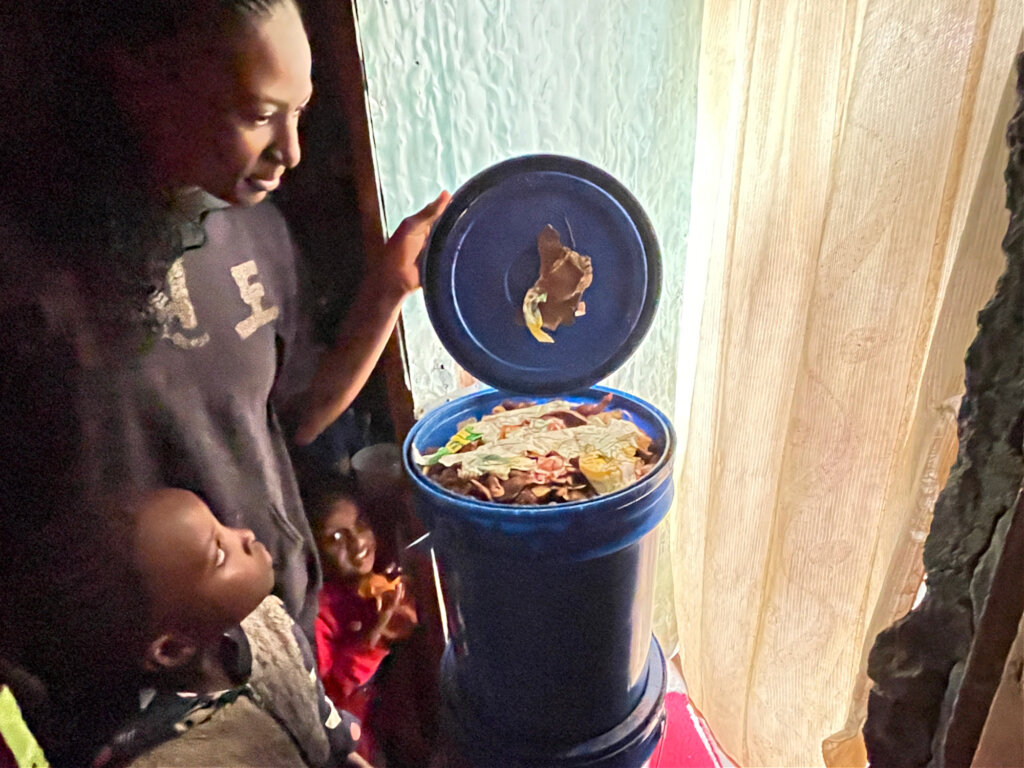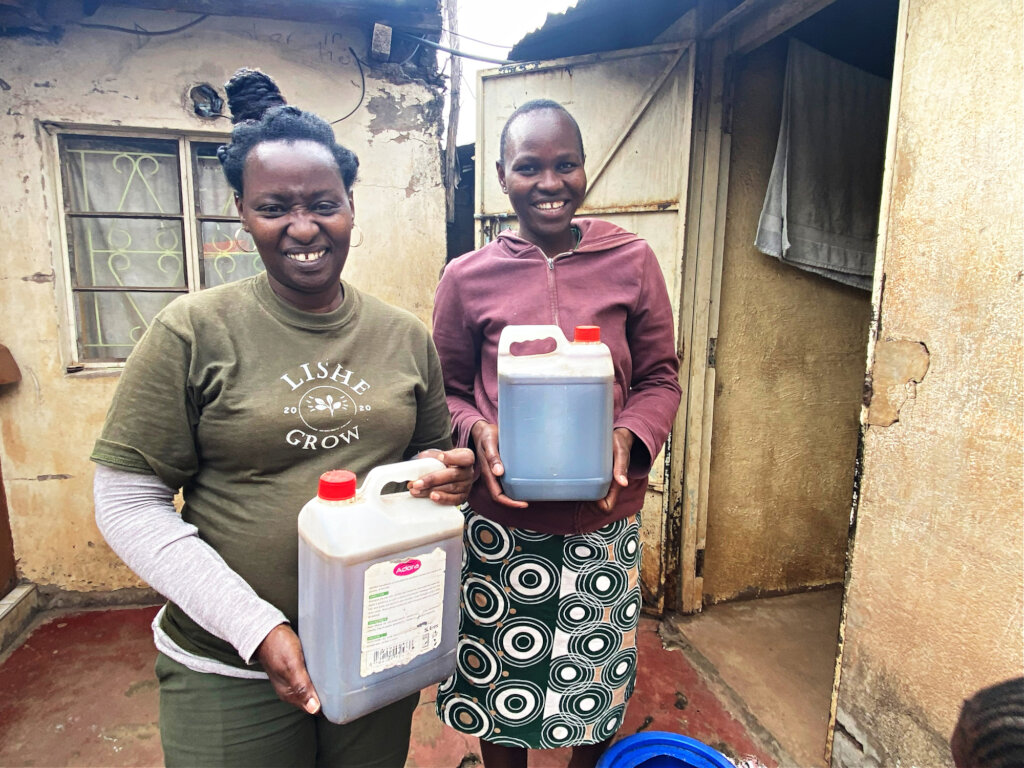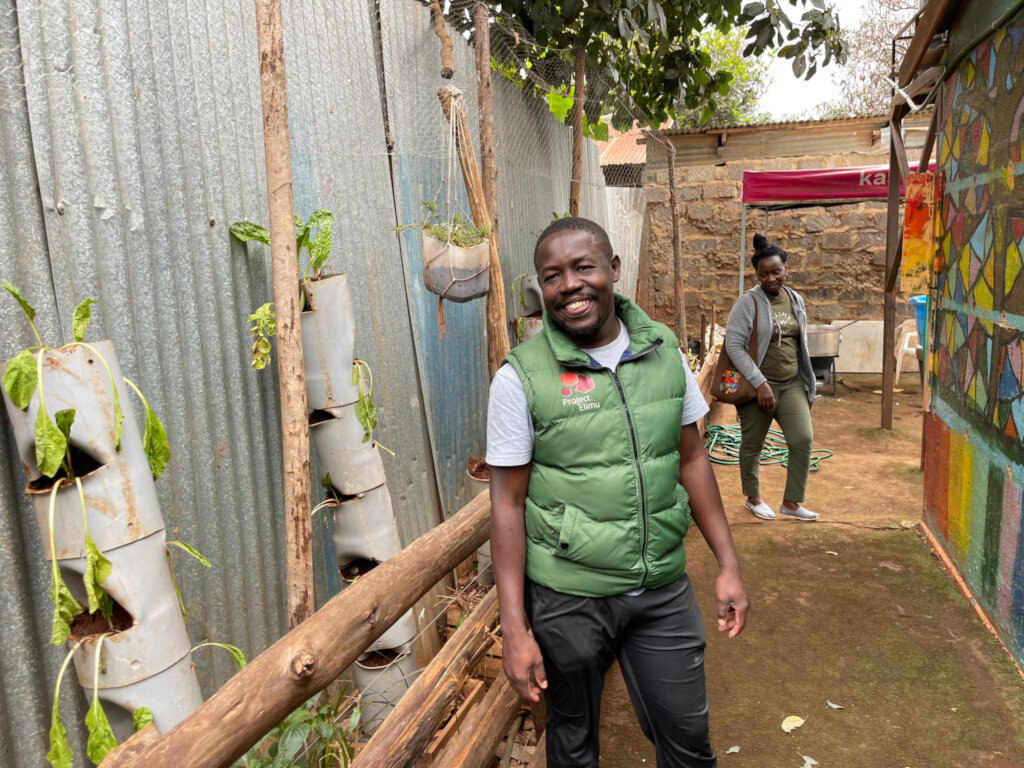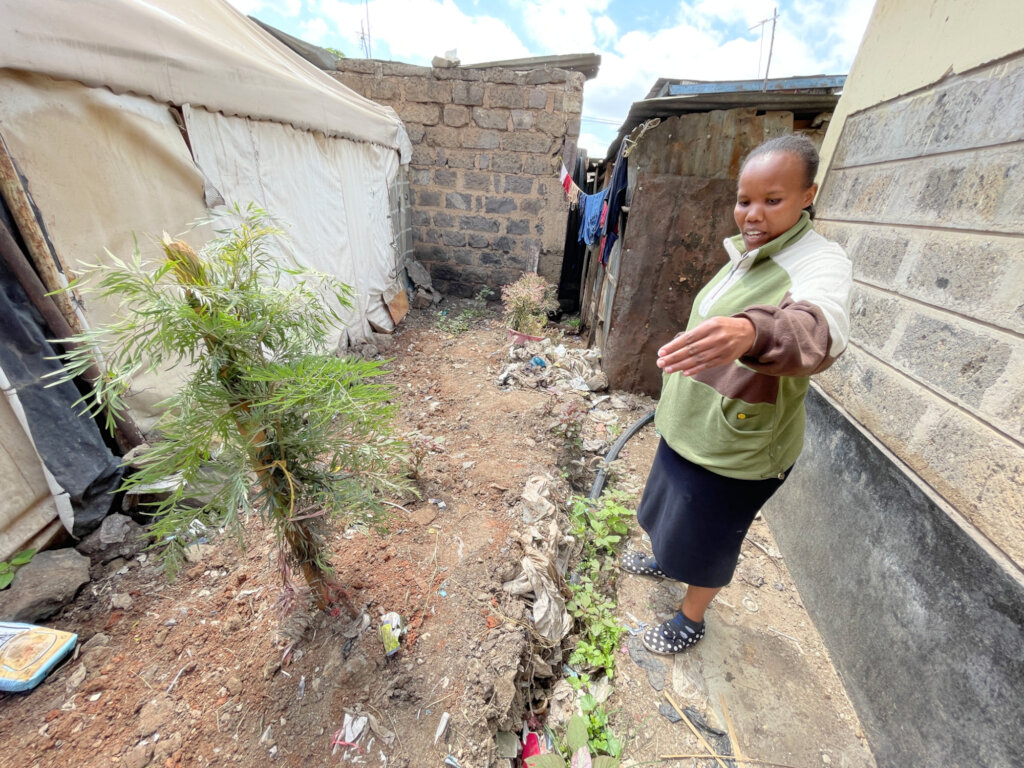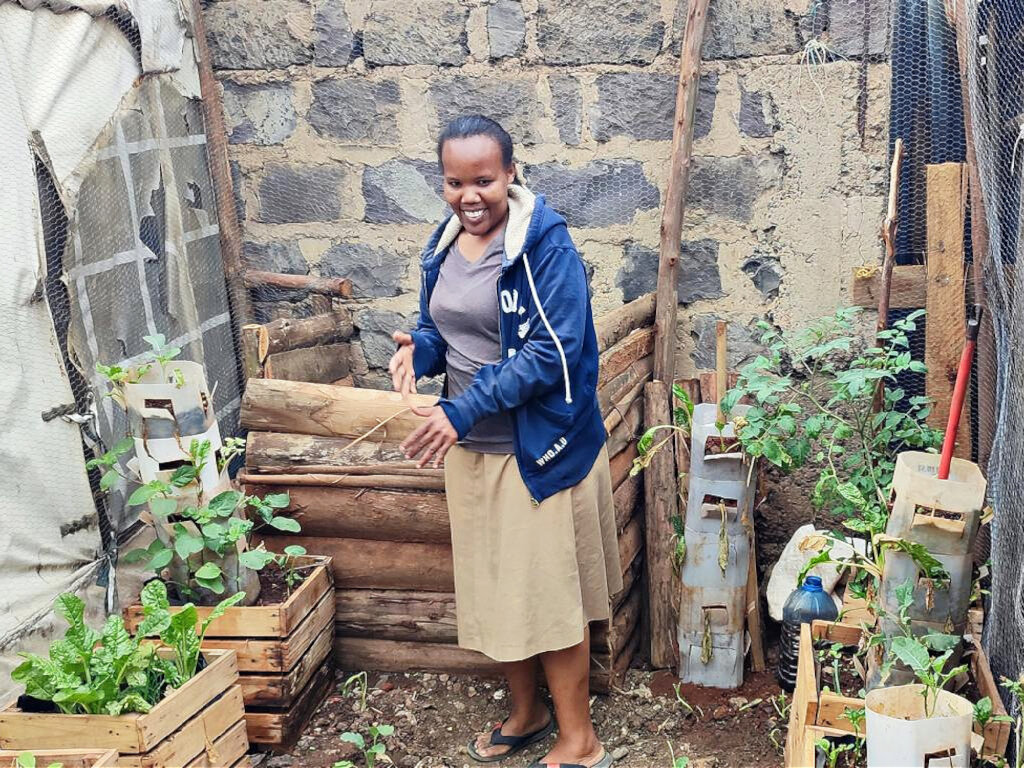By Iain Guest | Project coordinator in the US
This report is going to 21 friends who have donated $1,180 to our appeal on behalf of composters in the informal settlements of Nairobi. Our thanks to you all!
Building on your donations we were able to raise another $25,000 last year and this enabled the composters to recover a combined 3.89 tons of food waste – an amazing achievement. I visited them last Fall in the company of their indefatigable coordinator Stella. In this report I want to explain how composting has enriched their lives.
First, a brief recap.
The project began in 2019 after forty women from Kibera and several adjacent settlements attended embroidery training by The Advocacy Project in Nairobi. Twelve trainees decided to stay together and formed an association, Shield of Faith, to tackle pollution and food shortages in the settlements.
Shield of Faith now has 20 members. Almost all are single mothers and ten have children with albinism. Some of these children have been sent to boarding school to protect them against bullying and violence in the settlements. But other mothers cannot bear to live without their children and keep them close. All Shield of Faith members are fiercely protective of each other and their families.
Waste
The settlements of Nairobi are called informal for a reason. Most of the electricity is tapped (illegally) from power lines that run above the houses and sold to residents at exorbitant rates. There is no such thing as maintenance and shortly after our visit Margaret, one of the composters, learned that her eight-year old granddaughter had touched a live wire while playing outside and died instantly. Margaret had to find 14,000 Kenyan shillings to pay for the funeral – equivalent to two months wages.
The homes of the composters are impossibly cramped. Ruth lives with her son, 14, who has albinism, in a single room on the fourth floor of a tenement building in the settlement of Huruma. There are no lights in the stairwell and Ruth hauls heavy buckets of water up through the blackness several times a day. She and her son also share an open toilet and shower with other families that live along the same corridor. Water is so expensive that Ruth saves the water she uses from washing clothes and dishes to flush waste down the toilet. Garbage is taken down to the street level and dumped.
Ruth has no personal space. Until recently she slept with her son on the floor, which was bone-chillingly cold during winter. She has since purchased a bed that can accommodate them both, but the bed now takes up even more space and is squeezed in between Ruth’s sewing machine and cooking area. Trade-offs abound in these settlements.
I asked Ruth why she goes to the effort of composting in such a confined space. Does it not create more of a burden? She answered by introducing us to her Red Wriggler worms, which live in blue composting bins (“wormy bins”) and chomp away at the food scraps. Ruth plunged her hand into the muck and pulled out one of the creatures for our inspection. “I live with these worms,” she says happily. “We have to share this tiny space!”
The partnership works because the worms allow Ruth to manage her garbage. The more she composts, the less she has to haul down the darkened stairwell and out into the streets. The worms also keep the waste free of odor, which is essential in such a small space. Most of the composters clean out their bins every six months.
There are other side benefits. The project has purchased scales for each composter, and Ruth weighs the leftovers after every meal before adding them to her bins. Collecting data regularly in such a confined space requires discipline, but it also produces a sense of accomplishment and a modest income. Under Stella’s system (“pay to weigh”) each composter receives 800 Kenyan shillings a month to weigh and record the amount she recovers. Stella then enters the data into an online “output tracker” that is accessible to our team in the US, volunteers, donors and (if need be) auditors.
The worms also secrete a highly concentrated liquid, or leachate, that the composters drain from the bottom bin. They have named the leachate Lishe-Grow (“Grow Nutrition” in Swahili) and last year they bottled 522 liters, exceeding all expectations. They sold 42 liters and hope to sell more in 2024. Several composters add Lishe-Grow to their kitchen gardens. Stella also plans to use it on a plot of land outside Nairobi that will serve as a center for cultivation and training.
All of this is impressive, but what matters most to Ruth is that she is transforming her garbage – including even worm poop – into something of value. This rounded oout my own education. I visited Ruth thinking that the rigmarole of composting – collecting, binning, weighing, reporting, managing worms, and draining leachate – could only add to the pressure. I left realizing that nothing could be further from the truth. Composting allows Ruth and the others to manage their personal space and gives them agency in a cruel environment that robs them of many basic rights and services.
Food
If Shield of Faith’s first goal is to curb pollution, growing food comes a close second. Most produce sold in Kibera is grown in sewage and this has led to undernutrition and stunting among children. Added to which the food is expensive and can account for a third of a family’s weekly bills.
Producing organic food in a settlement like Kibera would seem to be an impossible dream, because very few families have a yard, let alone cultivable land. In spite of this, twelve composters erected kitchen gardens and grew their own food in 2023. The gardens themselves are miracles of innovation, fashioned from recycled wood and used plastic containers into which are added soil, seeds and Lishe-Grow. Some composters have begun to grow vegetables in vertical plastic towers, which are fed with water from the top and fit perfectly into a confined space.
Most of the gardeners grow collard greens, known locally as sukuma wiki, which is sturdy and nutritious. They also plant kale, cabbage, strawberries, lettuce, cucumbers, maize, tomatoes, onions and pumpkins. Several varieties can last up to 4 months before they are exhausted and need to be replaced with new seedlings or cuttings. The discarded plants are composted.
Stella visits the composters regularly to offer advice and finds that water is often a problem. One of the most active composters, Roseanne, keeps chickens which provide her garden with manure. But when we visited Roseanne’s garden the soil in her plastic towers was drying out too quickly and causing her vegetables to wither. Stella recommended adding some worm castings and compost. Beldine, another composter, has lovingly covered her plants with a blanket of recycled netting to protect them from the sun and heavy rains. Stella’s verdict: “Beldine – you’re a star!”
Does all of this effiort actually produce serious food? I asked the question while face to face with some drooping sukuma wiki in another garden. Not to worry, said Stella, the plants would perk up after being watered. Vena, the owner of the garden, told us that she harvests vegetables three times a week, which is enough for several meals. In addition to the nutritional benefits, Vena also saves money.
All of which was music to Stella’s ears. The idea of growing organic food in the midst of such an unhealthy environment appeals to her deeply.
Change
On their own the Kibera composters will have little impact on a settlement of over 250,000 souls that generates over 200 tons of garbage a day. As a result, they plan to take their model out into the community and become, in Stella’s words, “catalysts for change.”
One point of entry could be public schools, which offer a cooked meal to students every day and in the process generate prodigious amounts of organic waste. Once composting catches on in one school, says Stella, others will follow.
Stella took a step in this direction last year when she and Vena erected a kitchen garden at Project Elimu, an after-school program that offers ballet and art to over 200 children at weekends and many more during the holidays.
The children were happy to get into the dirt and Michael, the visionary founder of Elimu, was delighted to add gardening to the curriculum. “Kibera is very rough on children,” he told me. “But when we show them how tomatoes grow, they want to water the plants. This brings out a kindness in them and affects the way they deal with other children.” One of Michael’s student leaders, Felix, has agreed to serve as a Shield of Faith “green ambassador.”
Under Stella’s 2024 plan, ten Shield of Faith composters will collect organic waste from their neighbors and create “composting hubs.” The hustle and bustle of settlement life will no doubt help. Outside the Elimu center, the streets are alive with street vendors selling fruit, vegetables and cooked snacks like kangumu (crunchy cakes) or mandazi (a local donut). Some variety of food is found at every corner and most of it generates organic waste that could be composted.
Some hubs are already under way. Eunice collects waste from her neighbors to feed her large garden, which is an island of green in a sea of gray Kibera grime. Several other Shield of Faith members plant and harvest vegetables in Eunice’s garden.
At first sight, the hub idea will not work for composters like Ruth, who lives high up in a tenement block and does not have a garden. But Ruth is determined to grow her own food so she approached the local authority and asked to rent a tiny strip of waste-land a kilometer from her building.
The plot was littered with rubbish when we visited in August, but the prospect of going green was already putting a smile on Ruth’s face. Sure enough, after several weeks of hard work, her garden was sprouting the ubiquitous sukuma wiki and composting was well under way. Stella’s before and after photos say it all.
We hope you will stay engaged with this incredible group of women!
In gratitude
Iain and the AP team
Project reports on GlobalGiving are posted directly to globalgiving.org by Project Leaders as they are completed, generally every 3-4 months. To protect the integrity of these documents, GlobalGiving does not alter them; therefore you may find some language or formatting issues.
If you donate to this project or have donated to this project, you can recieve an email when this project posts a report. You can also subscribe for reports without donating.
Support this important cause by creating a personalized fundraising page.
Start a Fundraiser